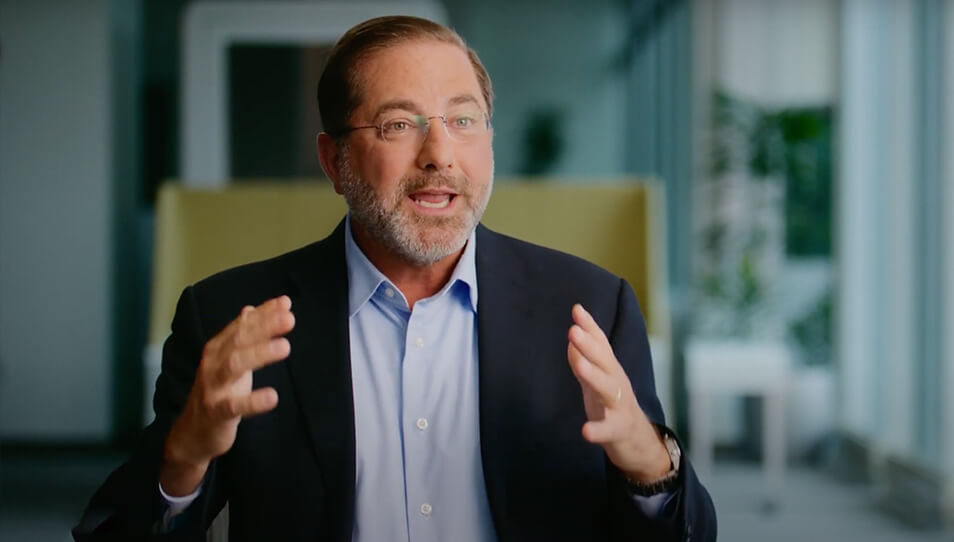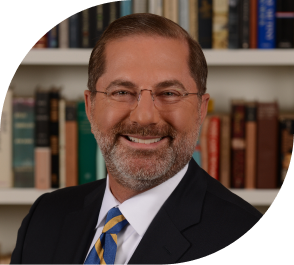New Value-Based Models of Care Bring Hope to People Living with Kidney Disease
The new value-based models of care incentivize things that are unavailable in a fee-for-service model. Earlier education, mental health support, better nutrition, tighter care coordination all help slow the progression of CKD.
tags

We discuss the future of kidney care with Alex Azar, board member of Interwell Health, who previously served as the 24th Secretary of the U.S. Department of Health and Human Services from 2018 to 2021. As secretary, Azar led the most significant changes in 50 years to how chronic kidney disease (CKD) is prevented and treated in the United States.
Q: Why are you so passionate about reimagining how we deliver kidney care and improving patients’ lives?
AA: A few years ago, I lost my father to kidney failure after an auto-immune disorder rapidly destroyed his kidney function. That led to outpatient dialysis treatment three times a week, then a transition to home dialysis, and finally to receiving a donor kidney. After his transplant, he enjoyed a high quality of life for another five years. This experience helped me better understand the incredible need, and incredible opportunity, to improve patient lives – if only we thought more about prevention and how to pay for it, such as through more value-based care options.
Q: Why is the current way we deliver care not working anymore and how can we change it?
AA: The status quo in kidney care has been failing everyone for too long. We have had a lack of focus on prevention, even amid soaring costs. I was determined to change this and announced the Advancing American Kidney Health Initiative in 2018 while serving as secretary. This shifted more attention and resources toward managing CKD before kidney failure, better educating patients on treatment options, increasing transplants, and driving more dialysis care to the home, where most people prefer to receive treatment.
We also helped create an environment where value-based care providers could succeed and flourish. Innovative new companies are offering a wide variety of solutions to meet this challenge.
Q: Now we are seeing companies like Interwell Health grow rapidly into a force for change in the industry. How exciting is it to see this momentum?
AA: We are entering a period of rapid innovation in kidney care that is transforming the model for how we support patients. These new value-based models of care are incredibly exciting. They incentivize earlier education, mental health support, better nutrition, tighter care coordination, and tools to intervene and slow progression of disease that are unavailable in a fee-for-service model. The current system is simply not working. There is no turning back. I don’t see any alternative but for value-based care to lead the way forward.
Q: How big a challenge is kidney care in this country? Can you quantify it?
AA: Solving this challenge is an urgent matter. Not only is kidney disease a chronic condition with extreme impacts to patient health and quality of life, it’s a significant cost burden. In 2019, the 15% of Medicare beneficiaries with CKD and kidney failure cost Medicare $124.5 billion – that’s one out of every five dollars spent by Medicare. Tens of billions of these costs could be prevented with better care management and early identification.
More than 37 million Americans live with CKD and 90% don’t even know they have it. Far too many eventually crash into the emergency room needing urgent dialysis having never received the early education and support they needed. Each crash into dialysis is terrible for the patient’s health and costs payers around $50,000 dollars. We can do better.
Q: Why did you decide to join the board of Interwell Health?
AA: I think Interwell has put all the pieces of the puzzle together. They have brought together a network of 1,700 nephrologists across the country who believe in the shift to value-based care and have joined their mission to reimagine kidney care. They have tight coordination with a network of 2,600 dialysis centers nationwide. And they can deliver holistic wraparound care for patients between doctor visits.
I’ve been especially impressed with Interwell’s results to date. They’ve been able to deliver a 20% reduction in hospitalization across all members under management, not just a selected group. That’s a big impact at scale. -Alex Azar

Alex Azar
Board Member
Alex Azar served as the 24th Secretary of the U.S. Department of Health and Human Services. As secretary, he led the largest changes in 50 years to how chronic kidney disease is prevented and treated and was also the architect of Operation Warp Speed.